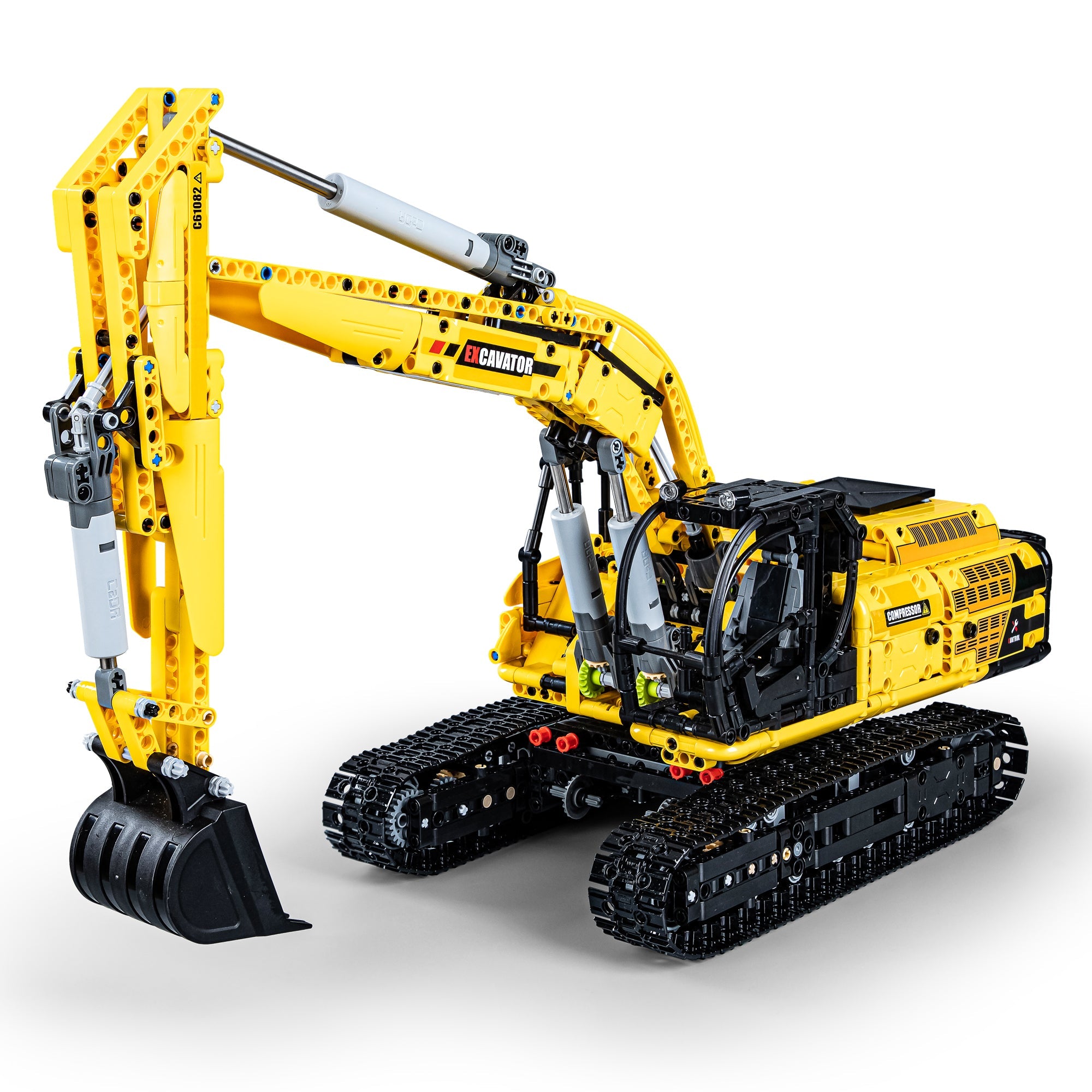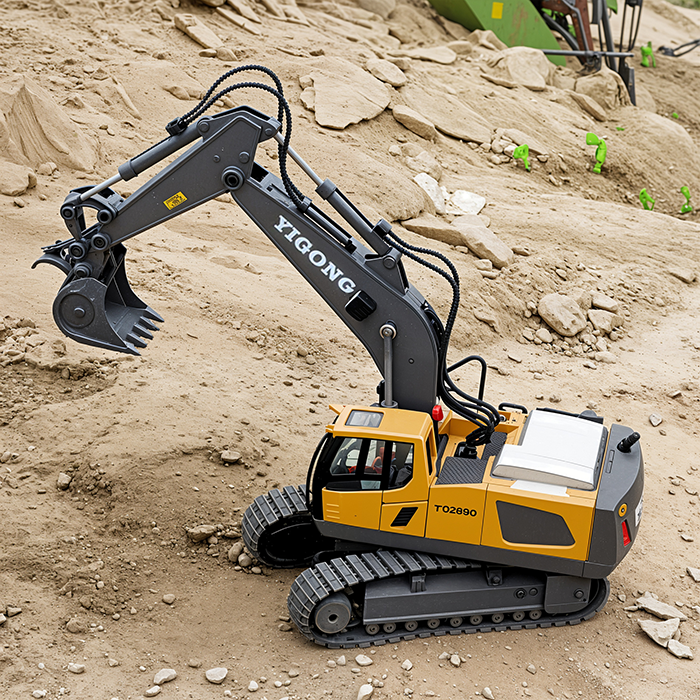Comprehending Just How Excavator Works and Its Influence on Performance
Excavators play a crucial duty in construction and mining procedures, depending on a complicated interplay of hydraulic and mechanical systems. Their ability to perform a range of jobs pivots on both their style and the innovation incorporated within. Recognizing these elements can considerably affect functional performance and productivity. As advancements proceed to improve the market, one have to think about just how these modifications will affect future practices and performance.
The Fundamentals of Excavator Mechanics

The Function of Hydraulic Solutions in Excavators
At the heart of excavator operation lies the hydraulic system, which plays a crucial function in powering the device's functions and activities. This system utilizes pressurized hydraulic liquid to move energy, enabling different actions such as lifting, excavating, and swinging. By harnessing the principles of hydraulics, excavators can carry out jobs with exceptional precision and pressure, enhancing overall operational efficiency.The hydraulic system is composed of crucial elements, including cylinders, pumps, and valves, which collaborate to control the circulation and instructions of the liquid. When the driver engages the controls, the hydraulic liquid is guided to certain cyndrical tubes, translating the driver's commands into physical movement. This device allows for receptive and smooth activities, which are essential in building and excavation atmospheres. double e volvo rc excavator. The effectiveness of the hydraulic system straight influences the productivity and convenience of the excavator, making it an indispensable element in contemporary excavation processes
Secret Components of an Excavator
Recognizing the essential elements of an excavator is crucial for grasping exactly how this powerful equipment operates. An excavator consists of a number of substantial elements, consisting of the undercarriage, house, boom, arm, and container. The undercarriage offers security and mobility, often including tracks or wheels to navigate different terrains. Your house consists of the engine and hydraulic systems, enabling the driver to regulate movement and power the device. The boom expands from your home, enabling vertical reach, while the arm connects to the bucket, promoting digging and lifting operations.Additionally, the taxi houses the driver, furnished with controls for precise maneuvering. Each of these components plays a crucial role in the excavator's general functionality, adding to its efficiency and performance on construction sites. Understanding these components aids in enhancing and maintaining excavator performance, ensuring tasks are completed securely and properly.
Accessory Convenience and Its Benefits
Accessory adaptability is a crucial facet of excavators, enabling drivers to change between various devices tailored for specific tasks. This adaptability not only enhances task efficiency yet also contributes to cost-effectiveness by lowering the need for numerous machines. Recognizing the different kinds of accessories offered can greatly influence the general performance and capability of an excavator on job sites.
Types of Add-ons
While excavators are mainly identified for their digging capabilities, their real versatility hinges on the large array of attachments readily available. These attachments enhance the excavator's capability, enabling it to perform numerous tasks past excavation. Common attachments include pails (for digging and scooping), hydraulic thumbs (for understanding products), and augers (for drilling openings) Grapples are utilized for managing and moving debris, while rippers can break up difficult surfaces. Other specialized accessories, such as plates and plows, allow excavators to adapt to specific task needs. This diversity not just raises the machine's utility throughout different markets, consisting of landscape design, demolition, and building, however also enables operators to customize their devices to meet certain project needs efficiently.
Enhanced Task Efficiency
Making best use of job effectiveness is a key advantage of making use of numerous excavator add-ons. Different attachments permit an excavator to do several jobs without requiring to switch over tools, saving useful time and labor. Making use of a hydraulic hammer can break concrete while a pail accessory can excavate dirt, allowing a smooth operations. This convenience minimizes downtime related to devices adjustments and enhances efficiency on-site. Additionally, specialized attachments improve accuracy in jobs such as grading or landscape design, bring about greater top quality end results. The ability to adapt to numerous job needs not just streamlines operations however also reduces the requirement for added equipment, making sure that tasks are completed promptly and successfully. On the whole, add-on adaptability substantially contributes to raised work effectiveness in excavation work.
Cost-Effectiveness and Adaptability
Cost-effectiveness is a significant advantage of making use of flexible excavator attachments. These add-ons allow a solitary excavator to execute several jobs, decreasing the need for additional equipment and labor - double e volvo rc excavator. By changing in between containers, hammers, and grapples, drivers can tackle different tasks, from excavating to demolition, consequently taking full advantage of devices utilization. This flexibility not only decreases functional expenses but additionally lessens downtime associated with transforming tools. In addition, the capability to tailor excavators with specialized attachments boosts efficiency, as they can efficiently take care of varied jobs according to project needs. To conclude, the combination of cost-effectiveness and versatility in excavator attachments adds to improved functional performance and resource allowance in construction and excavation jobs

Advanced Technology in Modern Excavators
Modern excavators are progressively equipped with sophisticated modern technology that changes excavation procedures. Automation simplifies operations, while improved fuel effectiveness minimizes functional expenses. Additionally, clever control systems enhance accuracy and safety and security, marking a considerable advancement in excavation tools.
Automation in Excavation Processes
As excavation technology develops, automation has actually become a critical part in improving performance and precision on original site task sites. Modern excavators are furnished with advanced automated systems that assist in jobs such as grading, excavating, and trenching with very little operator treatment. These systems use sensors, GPS, and device discovering formulas to guarantee accurate placing and depth control, considerably decreasing the margin for error. In addition, automation enables operators to concentrate on calculated decision-making as opposed to hands-on controls, bring about improved efficiency overall. Such technologies not only streamline process yet also boost safety by reducing human error in complex operations. Consequently, the combination of automation in excavation processes represents a significant advancement in building innovation, driving the industry towards better effectiveness and effectiveness.
Enhanced Gas Effectiveness
Innovations in modern technology have actually additionally led to considerable renovations in gas efficiency for contemporary excavators. Modern makers are furnished with sophisticated engines that maximize power result while reducing fuel consumption. These engines utilize innovative burning modern technologies, such as turbocharging and direct gas shot, to boost performance and performance. Additionally, lightweight products in building lower general weight, enabling much less power their explanation expense throughout operation. The intro of variable rate controls makes it possible for operators to change engine efficiency according to particular jobs, further decreasing fuel usage. Therefore, these improvements not only reduced functional prices however additionally add to environmental sustainability by minimizing emissions. On the whole, boosted gas efficiency in excavators is a crucial development that strengthens efficiency and economic practicality in the construction market.
Smart Control Systems
While operators navigate increasingly complicated task websites, wise control systems in excavators have actually emerged as crucial devices for boosting effectiveness and accuracy. These innovative innovations use formulas and sensors to monitor numerous criteria such as lots weight, surface problems, and functional efficiency. By immediately readjusting hydraulic features, clever systems enhance equipment performance, resulting in improved performance and minimized wear on parts. Additionally, drivers profit from instinctive user interfaces that give real-time feedback and diagnostics, enabling for educated decision-making. This assimilation of innovation not only enhances procedures however additionally reduces human error, adding to safer workplace. As the building and construction industry continues to progress, wise control systems will certainly play an essential duty fit the future of excavator effectiveness and performance.
Enhancing Functional Effectiveness With Excavators
Excavators play an important function in boosting operational efficiency across different construction and excavation tasks. Their flexibility permits for numerous jobs, including material, lifting, and digging handling, which streamlines process and minimizes the need for added tools. With powerful hydraulic systems, excavators can perform sturdy jobs with accuracy, considerably lowering the moment required to complete tasks. The combination of sophisticated modern technology, such as GPS and automated controls, further enhances their procedure, making it possible for drivers to accomplish greater accuracy and lower product waste. In addition, contemporary excavators are made to eat much less gas and minimize exhausts, contributing to both cost savings and ecological sustainability. By making use of excavators efficiently, building teams can boost productivity, satisfy job deadlines, and improve total website monitoring. This multifunctionality and performance make excavators important devices in the contemporary construction landscape.
The Future of Excavators in Building and Mining Industries
As the navigate to these guys building and mining sectors develop, the future of excavators is positioned for considerable transformation driven by technical technology and changing operational demands. Advancements in automation and expert system are reshaping excavator capabilities, allowing for improved precision and effectiveness in operations. Independent excavators are emerging, lowering the requirement for human treatment and decreasing the danger of accidents.Moreover, the combination of telematics and IoT modern technology makes it possible for real-time monitoring of equipment performance and predictive upkeep, maximizing uptime. Environment-friendly designs, including hybrid and electrical models, are obtaining grip, straightening with sustainability objectives within the industry.Additionally, using advanced materials and lighter styles enhances fuel effectiveness while maintaining efficiency requirements. As these trends progress, excavators will certainly play a vital role in satisfying the increasing needs for efficiency and safety and security in building and construction and mining, inevitably changing operational landscapes.
Frequently Asked Inquiries
Exactly How Do Weather Condition Problems Affect Excavator Efficiency?

Climate conditions greatly influence excavator efficiency, as rainfall and mud can prevent grip and security, while extreme temperature levels may affect hydraulic systems. Operators should adjust to these variables to assure ideal functionality and security during operations.
What Precaution Should Operators Follow While Utilizing Excavators?
Precaution for excavator operators include using suitable individual protective tools, performing pre-operation evaluations, making certain appropriate interaction with ground personnel, keeping a risk-free distance from above risks, and sticking to well-known functional protocols to avoid mishaps.
Exactly How Commonly Should Excavators Be Kept for Optimal Performance?
Excavators should be kept routinely to assure peak efficiency, normally every 250 operating hours or as specified by the maker. Regular checks enhance integrity, avoid unexpected breakdowns, and prolong the lifespan of the equipment.
What Is the Ordinary Lifespan of an Excavator?
The ordinary lifespan of an excavator typically varies from 10,000 to 15,000 hours of procedure. Elements affecting longevity include maintenance practices, running problems, and the high quality of the machine itself, influencing general productivity and effectiveness.

Can Excavators Operate on Uneven Surface Efficiently?
Excavators can operate successfully on unequal surface because of their verbalized layouts and adjustable tracks. These attributes permit them to preserve stability and traction, making it possible for efficient operation in tough environments commonly come across in building and landscaping jobs. Each of these components plays an essential role in the excavator's overall performance, contributing to its effectiveness and performance on building and construction sites. Maximizing job effectiveness is a key benefit of utilizing various excavator add-ons. While drivers browse progressively complex work websites, clever control systems in excavators have actually arised as crucial devices for enhancing effectiveness and accuracy. Excavators play a necessary function in improving functional effectiveness throughout different building and excavation projects. Advancements in automation and fabricated knowledge are improving excavator capacities, enabling for boosted accuracy and efficiency in procedures.